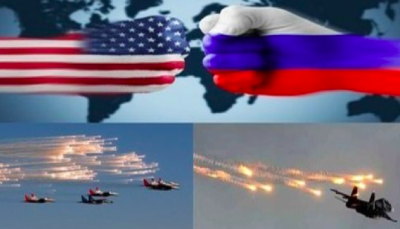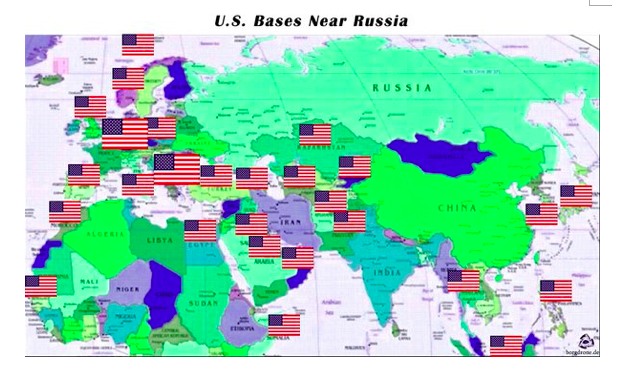Ukraine: The Moment of Truth

All Global Research articles can be read in 51 languages by activating the “Translate Website” drop down menu on the top banner of our home page (Desktop version).
To receive Global Research’s Daily Newsletter (selected articles), click here.
Visit and follow us on Instagram, Twitter and Facebook. Feel free to repost and share widely Global Research articles.
***
“The war in Ukraine is the most dangerous international conflict since the 1962 Cuban missile crisis. The West, and especially America, is principally responsible for the crisis which began in February 2014. It has now turned into a war that not only threatens to destroy Ukraine, but also has the potential to escalate into a nuclear war between Russia and NATO.” — Prof. John Mearsheimer
***
The war in Ukraine will shape the global order of the 21st century. Even for those without a basic understanding of geopolitics, the war is in Ukraine, but not between Russia and Ukraine. The war, or military operation, as the Kremlin framed it, is between Russia and the so-called “Collective West”.
The end of this war will re-configure the post-1945 security architecture and most likely will end the experiment of globalisation (global village, global citizen) as we know it, an euphemism for movement of a) capital (one direction) and b) resources and labour (opposite direction). There will be a multipolarity with quasi continental axis of political power based on economic, trade, financial and ultimately even security arrangements.
Welcome to the newly emerging regionalization aka autarky, a truly fascinating period to remember the famous Chinese proverb: “we are living in interesting times” which times, according to the ancient tradition is the absolute worst Chinese curse.
In many aspects (to use the Marxist lexicon of “superstructure”) we are living in a gravitational field of autarky, due to old cleavages resulting from Churchill’s famous “Iron Curtain” speech in 1946.
In this context, I would like to share a personal introduction to this article.
In the last 20 years since I started teaching I always asked on May 9 what was the most important event that happened on that day?
Answers varied: typhoon in Indonesia, hijacking plane in Sri Lanka, elections in South Korea. In the last two decades, the only time I received the right answer i.e. capitulation of Germany came from a student born in the same city as Mikhail Gorbachev, Stavropol.
The vast majority of my students most in their 3 and 4 years as Political Science majors had not heard about the Red Army (with a very few exceptions).
World War II was taught in the following way:
Hitler invaded Europe, then there was the D-Day (the Battle of Normandy, D-Day, when some 156,000 American, British and Canadian forces landed in Normandy) followed shortly by V-Day (Victory Day).
The main narrative was that the American army destroyed the German Wehrmacht. My students, were surprised to learn that in fact the Red Army defeated Germany and that USSR lost 24,000,000 people, compared to 418 000 Americans, 45 000 Canadians.
This so-called “alternative view” was not about some marginal regional skirmish but the most devasting conflict human civilization had ever seen, which shaped the politics of the 20th century.
Why I am referring to this?
It is abundantly clear that today, the war in Ukraine plays the role of a catalyst increasing the interpretative cleavages, where the nexus of facts, documents, official statements and front-line reportages represent narratives where the only common and mutually agreed denominator is the geography – Ukraine.
The current media coverage no longer represents a new and deeply fragmented world. In Ukraine radically opposed “truths”, views, basic data belong to what theoretical mathematicians and astrophysicists call parallel galaxies.
The old Machiavellian dilemma of political survival based on “duality of truth” public (plebs) versus inner circle of government (elite) is now achievable with an impenetrable layer of censorship matching the specification of concrete grade for nuclear bunkers.
How is this possible in the era of non-stop 24/7 cycle of competing communication/propaganda narratives?
The answer is obvious.
This is not a new phenomena. In a meticulously documented book, Jeffrey Herf depicts the mechanics and efficacy of the Third Reich propaganda machine where there is one very revealing factoid.
In the very last days of WWII, while Russian forces were approaching Berlin, Goebbel’s propaganda explained the non-stop cannonade with the following hard to believe justification – shooting of an epic war film, “Live goes on” so to settle German citizens from worrying about the relentless cannonade. Berliners believed that Germany was winning the war and when they saw with their own eyes the first Russian tanks, they believed that they were part of the film crew….
This happened more than 70 years ago using mass produced cheap radio… try to compare to today’s state of the art mass media with its endless capacity producing fake news, which deep fake and visual effects could rightfully be envied by Hollywood.
To go back to todays military conflict in Ukraine.
As a long-term supporter of a non-killing society, I unequivocally condemn any act of aggression, including the war in Ukraine. It is, simply put, a tragedy. At the same time, legitimate questions remain unanswered. Did we really have an honest public discourse about the causes for the Russian military operation, aka war in Ukraine? Listening to what once used to be mass media or now represents the “Ministry of Truth” – this is a “Putin War”.
This explanation is quite simple. There is only one problem in the equation – Putin. Therefore, the moment we get rid of Putin there will be no war, ergo regime change in Moscow. However according to the latest polls after the beginning of the military operation in Ukraine, Putin’s popularity jumped to 83%, now with vast public support.
This is a Russian, not a Putin war. How to explain this? The mainstream media knows the answer but prefers to be silent.
Furthermore, from the media coverage “conveniently” were omitted Russian (Putin’s?) proposals published on December 17 2021 which in my view, were the very last diplomatic demarch aiming to avoid this conflict.
Russian security concerns were not openly discussed.In a snapshot, they are
- no further expansion of NATO (Ukraine, Georgia),
- removal of missiles sites in Poland and Romania.
The response was a flat rejection by USA and NATO. (Europe did not count – for Moscow, EU is not an independent geopolitical player). These were quintessential proposals regarding European as well as world security. They were promptly rejected. The explanation from US and NATO was simple: Russia can not have any legitimate security concerns.
Really…?
Imagine the following hypothetical scenario, the Collective Security Treaty Organization (CSTO) with members: Armenia, Belarus, Kazakhstan, Kyrgyzstan, Russia, Tajikistan) as a defense military organisation continues to expand not only in Central Asia but also in Latin America.
First way of expansion are the old Russian satellites: Nicaragua, El Salvador, Guatemala. The next round is Brazil, Venezuela, Chile and Argentina. There are massive Russian military bases including Russian missile sites. The door is finally open to Mexico and …Canada. In Canada there is a pro-Russian coup d’état. The regime in Ottawa becomes the most anti-American regime not only in the Western hemisphere but in the world, surpassing even Teheran’s anti-American fever. Russian military hardware is flooding in all Canadian provinces. In addition, along the 4,000 km US- Canada border, Russia installs 30 bio-lab (research centers) under the supervision of Russian bioweapon specialists.
Most importantly due to geographic proximity Russian missiles could now hit Washington DC and New York in under 5 minutes, which makes them, de facto defenceless…
Washington is desperate to de-escalate the standoff and launches a diplomatic demarch by proposing the removal of Russian missiles sites, and written guarantees for the neutrality status to its neighbours, namely Canada and Mexico. Moscow and CTSO flatly reject these proposals.
Then…
For those who believe this is a cheap Kremlin propaganda, I suggest revisit 1962 Cuban missile crisis. Back then, both Kennedy and Khrushchev managed to avoid MAD (Mutually Assured Destruction) because they realised that the best course of action was de-escalation.
Unfortunately, 2022 is not 1962.
Instead of de-escalation there are clear indications suggesting the opposite coming from Russia on one side and USA and NATO on the other. The explanation from Jens Stoltenberg (Secretary General of NATO) rejecting the Russian peace proposals is that NATO is purely defense organisation and as such does not represent security concerns even less existential ones to whomever.
For starters such an argument is a hard sell.…
Was in reality Serbia representing such “a clear and present danger” to the security of NATO countries forcing the military alliance to amass 1000 combat planes?
Or ask Libyans. Was Gadhafi about to invade Europe in 2011? Or …Iraq in 2003?
The official NATO explanation stated that it was not about self-defence, but a policy with the enigmatic title “humanitarian intervention”.
In this way the first “NATO War” coined by the BBC as “Moral Combat” – Kosovo was presented not as an act of aggression, but as an act of “humanitarian intervention” where the blue helmets (the traditional peacekeeping operations) were asked to intervene lethally. As we all know the legality of this military operation or war or humanitarian intervention against Serbia happened without the approval of a UN Security Council resolution. Therefore, it was a violation of Article 51 of the United Nations – i.e. an act of aggression.
So much about the defense argument…
To remind our readers the “excuse” presented by NATO was found in the language of the legal definition of HI (Humanitarian Intervention).
“Humanitarian intervention is armed intervention in another country without that country’s consent to deal with or the threat of humanitarian disasters caused by serious and far-reaching violations of fundamental human rights.”
Therefore in 1999 NATO crossed the Rubicon obtaining carte blanche to intervene military anywhere, anytime on the planet, where according to Political Council in Brussels headquarters has decided that human rights might have been threatened.
To put the Ukraine conflict in this context.
It was already established that NATO forces can intervene any moment when there is a violation of human’s rights, just like in 1999 where there were 45 ethnic Albanians killed in the village of Racak in Kosovo which triggered humanitarian intervention and NATO planes bombed Serbia for 78 days consecutively.
Back to Ukraine. After 2014 coup (Maidan), the Kiev regime ordered the Ukrainian army to launch a military operation in the eastern republics of Lugansk and Donetsk using its full arsenal: air force, including tanks and heavy artillery. This resulted in 14,000 (Ukrainian) citizen casualties (not 45 as was the case in Kosovo)
14,000 dead most of them civilians including children is it a marginal element…?
To conclude with another “marginal element” in the chronology of Ukraine saga.
The NATO’s Bucharest summit in April 2008 pushed the alliance to announce that Ukraine and Georgia “membership in the Alliance is a question of when, not whether”…
This “red line” was interpreted as an existential threat for Russia and… USA decided to ignore it.
The results of the rejection of Moscow peace proposals were summarised by the. Russian Deputy Foreign Minister Alexander Grushko who used a biblical reference, “The moment of truth has come“.
We are living in this moment.
*
Note to readers: Please click the share buttons above or below. Follow us on Instagram, Twitter and Facebook. Feel free to repost and share widely Global Research articles.
Prof. Ivalyo Grouev is a prominent author and geopolitical analyst, teaches political science at the University of Ottawa.
All images in this article are from the author


